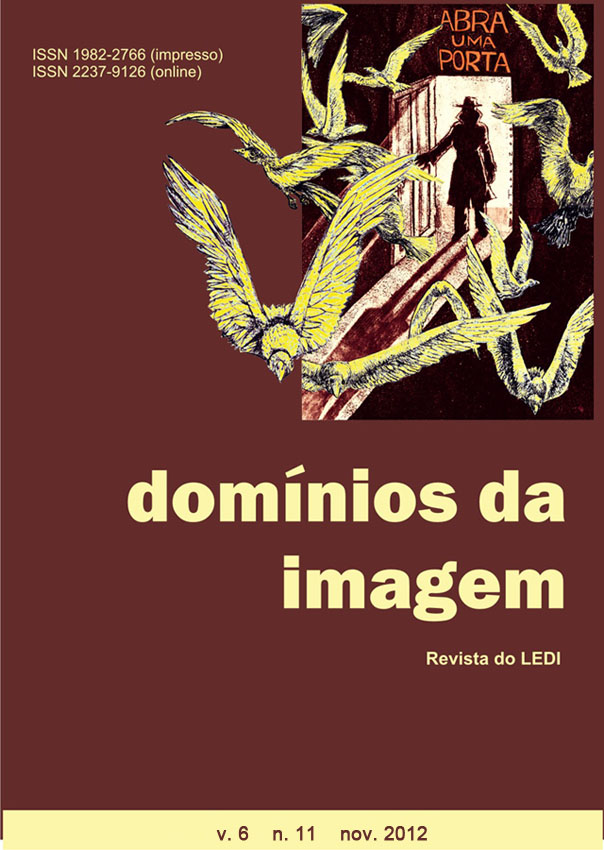An Actress “In the land of blood and honey”: Angelina Jolie, the Bosnian war and a study on memory, identity and humanitarian activism
DOI:
https://doi.org/10.5433/2237-9126.2012v6n11p71Keywords:
Bosnian War, Angelina Jolie, Memory.Abstract
From the analysis of the motion picture In the land of blood and honey, written and directed by the north-american actress Angelina Jolie, this article seeks to reflect on concepts such as forgiveness, memory and identity. This paper also put a question about the Jolie’s motivations for making the movie, considering that there is a identification between the actress and the community which in actual fact lived the Bosnian War (1992-1995), context of the love story told by the film. We verify that relation sustains itself by her involvement with humanitarian activities and through the responsibility, that she partially took, for the ineffective actions of the international community at that time. It comes to the conclusion that the movie is a memorial device and a type of instrument of humanitarian activism.Downloads
References
CANDAU, Joël. Preâmbulo; [de] O jogo social da memória e da identidade (2): fundar, construir [à] Conclusão. In: Memória e identidade. Tradução de Maria Leticia Ferreira. São Paulo: Contexto, 2011, p. 157-20; 137-206.
CHAUMONT, Jean-Michel. Du culte des héros à la concurrence des victimes. Criminologie. Montreal: Les presses de l’Université de Montréal, vol. 33, nº 1, p. 167-183, 2000.
D’ALÉSSIO, Márcia Mansor. Memória: leituras de M. Halbwachs e P. Nora. Revista Brasileira de História. São Paulo, ANPUH, v. 13, n. 25/26, set 92/ago93.
FARIAS, Francisco Ramos de. Pensando a memória social a partir da noção de “a posteriori” de Sigmund Freud. Morpheus. Rio de Janeiro, ano 8, nº 13, 2008. Disponível em: http://www.unirio.br/morpheusonline/numero13-2008/franciscofarias.htm . Acesso em 21 set. 2012.
FARIAS, Francisco Ramos de. Controvérsias no diagnóstico de psicopatia: memória e signos da violência. In: CONGRESSO LATINOAMERICANO DE PSICOLOGIA ULAPSI, 4., Montevideo, 26 a 28 abril 2012. Disponível e m: http://congresoulapsi2012.com/trabajos/1334270138_2416.pdf>. Acesso em 21 set. 2012.
GIOVANNI, Janine di. Possessed by war: a war she didn’t fully understand has inspired Angelina Jolie to get behind the camera for a love story set in Bosnia. Newsweek, Nova York, v. 158, n. 24, p. 16-23, 12 dez. 2011.
HALL, Stuart. A identidade em questão. In: A identidade cultural na pós-modernidade. Tradução de Tomaz Tadeu da Silva e Guacira Lopes Louro. 7. ed. Rio de Janeiro: DP&A, 2003. p. 7-22.
JOLIE, Angelina. Possessed by war: a war she didn’t fully understand has inspired Angelina Jolie to get behind the camera for a love story set in Bosnia. Newsweek, Nova York, v. 158, n. 24, p. 16-23, 12 dez. 2011. Entrevista concedida a Janine di Giovanni.
KALDOR, Mary. The idea of global civil society. International Affairs. Londres: Chatham House, v. 79, n. 3. p. 583-593, maio 2003.
LE GOFF, Jacques. Documento/Monumento. In: História e memória. Tradução de Irene Ferreira, Bernardo Leitão, Susana Ferreira Borges, 5. ed, Campinas, SP: Editora da UNICAMP, 2003, p. 525-541.
MUELLER, John. The banality of “ethnic war”. In: BROWN, Michael E. et al. Nationalism and ethnic conflict. Massachusetts: The MIT Press, 1997. p. 97-125.
NAPOLITANO, Marcos. A escrita fílmica da história e a monumentalização do passado: uma análise comparada de Amistad e Danton. In: CAPELATO, Maria Helena et al. História e cinema. São Paulo: Alameda, 2007. p. 65-83.
NORA, Pierre. Entre memória e história: a problemática dos lugares. Projeto História. São Paulo: Programa de Pós-graduação de História da PUC-SP, n. 10, p. 7-28, dez. 1993.
NORA, 1993 apud ENDERS, Armelle. Les Lieux de Mémoire, dez anos depois. Estudos Históricos, Rio de Janeiro: CPDOC, v. 6, n. 11, p. 132-137, 1993.
PERES, Andréa Carolina Schvartz. Campos de estupro: as mulheres e a guerra na Bósnia. Cad. Pagu, Campinas, n. 37, dez/2011.
POLLAK, Michael. Memória e identidade social. Estudos Históricos, Rio de Janeiro: CPDOC, v. 5, n. 10, p. 200-215, 1992.
POWER, Samantha. Bósnia: “Nada mais que os presentes em um funeral”. In: Genocídio: a retórica americana em questão. Tradução de Laura Teixeira Motta. São Paulo: Companhia das Letras, 2004. p. 288-377.
RICOEUR, Paul. O perdão pode curar? Viragem, nº 21, p. 26-29, 1996 (1-8, no documento consultado). Disponível em: http://migre.me/
a63uk. Acesso em 21 julho 2012.
RICOEUR, Paul. Os abusos da memória natural: memória impedida, memória manipulada, memória comandada de modo abusivo. In: RICOEUR, Paul. A memória, a história, o esquecimento. Tradução de Alain François [et al.]. Campinas, SP: Ed. UNICAMP, 2007. p. 82-104.
Downloads
Published
How to Cite
Issue
Section
License
Domínios da Imagem adopts the Creative Commons Attribution 4.0 International License, therefore, the copyrights related to the published articles belong to the author(s), who grant the journal the exclusive right of first publication.
Under this license it is possible to: Share - copy and redistribute the material in any medium or format. Adapt - remix, transform, and build upon the material, giving due credit and providing a link to the license and indicating if changes were made.












 The works in this journal are licensed under Creative Commons .
The works in this journal are licensed under Creative Commons .
